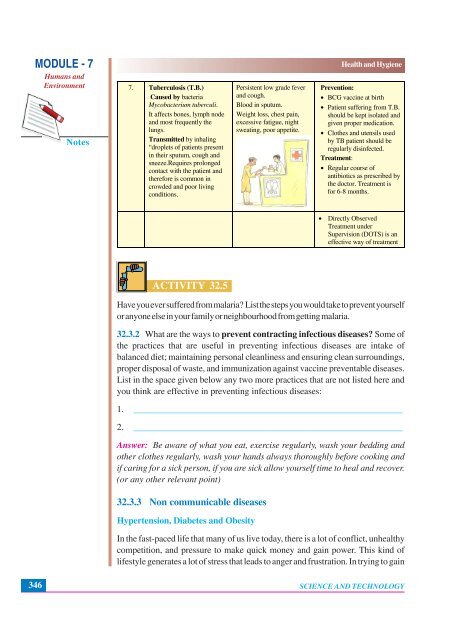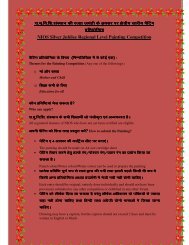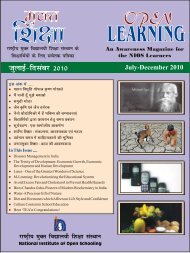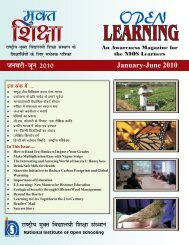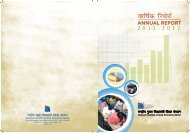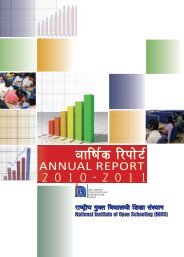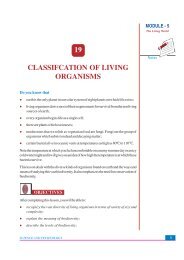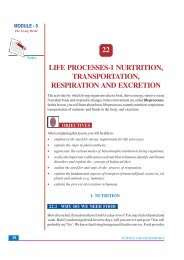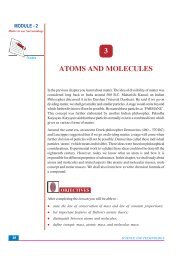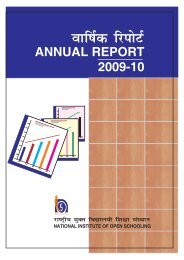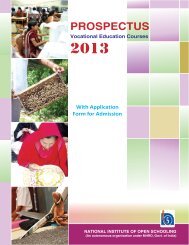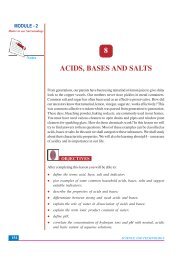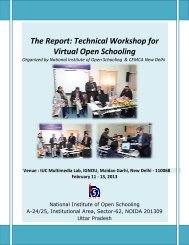32. Health and Hygiene - The National Institute of Open Schooling
32. Health and Hygiene - The National Institute of Open Schooling
32. Health and Hygiene - The National Institute of Open Schooling
Create successful ePaper yourself
Turn your PDF publications into a flip-book with our unique Google optimized e-Paper software.
MODULE - 7<br />
Humans <strong>and</strong><br />
Environment<br />
Notes<br />
7. Tuberculosis (T.B.)<br />
Caused by bacteria<br />
Mycobacterium tuberculi.<br />
It affects bones, lymph node<br />
<strong>and</strong> most frequently the<br />
lungs.<br />
Transmitted by inhaling<br />
“droplets <strong>of</strong> patients present<br />
in their sputum, cough <strong>and</strong><br />
sneeze.Requires prolonged<br />
contact with the patient <strong>and</strong><br />
therefore is common in<br />
crowded <strong>and</strong> poor living<br />
conditions.<br />
Persistent low grade fever<br />
<strong>and</strong> cough.<br />
Blood in sputum.<br />
Weight loss, chest pain,<br />
excessive fatigue, night<br />
sweating, poor appetite.<br />
<strong>Health</strong> <strong>and</strong> <strong>Hygiene</strong><br />
Prevention:<br />
• BCG vaccine at birth<br />
• Patient suffering from T.B.<br />
should be kept isolated <strong>and</strong><br />
given proper medication.<br />
• Clothes <strong>and</strong> utensils used<br />
by TB patient should be<br />
regularly disinfected.<br />
Treatment:<br />
• Regular course <strong>of</strong><br />
antibiotics as prescribed by<br />
the doctor. Treatment is<br />
for 6-8 months.<br />
• Directly Observed<br />
Treatment under<br />
Supervision (DOTS) is an<br />
effective way <strong>of</strong> treatment<br />
ACTIVITY <strong>32.</strong>5<br />
Have you ever suffered from malaria? List the steps you would take to prevent yourself<br />
or anyone else in your family or neighbourhood from getting malaria.<br />
<strong>32.</strong>3.2 What are the ways to prevent contracting infectious diseases? Some <strong>of</strong><br />
the practices that are useful in preventing infectious diseases are intake <strong>of</strong><br />
balanced diet; maintaining personal cleanliness <strong>and</strong> ensuring clean surroundings,<br />
proper disposal <strong>of</strong> waste, <strong>and</strong> immunization against vaccine preventable diseases.<br />
List in the space given below any two more practices that are not listed here <strong>and</strong><br />
you think are effective in preventing infectious diseases:<br />
1. ___________________________________________________________<br />
2. ___________________________________________________________<br />
Answer: Be aware <strong>of</strong> what you eat, exercise regularly, wash your bedding <strong>and</strong><br />
other clothes regularly, wash your h<strong>and</strong>s always thoroughly before cooking <strong>and</strong><br />
if caring for a sick person, if you are sick allow yourself time to heal <strong>and</strong> recover.<br />
(or any other relevant point)<br />
<strong>32.</strong>3.3 Non communicable diseases<br />
Hypertension, Diabetes <strong>and</strong> Obesity<br />
In the fast-paced life that many <strong>of</strong> us live today, there is a lot <strong>of</strong> conflict, unhealthy<br />
competition, <strong>and</strong> pressure to make quick money <strong>and</strong> gain power. This kind <strong>of</strong><br />
lifestyle generates a lot <strong>of</strong> stress that leads to anger <strong>and</strong> frustration. In trying to gain<br />
346<br />
SCIENCE AND TECHNOLOGY


